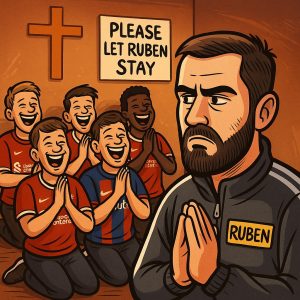Ruben Amorim at Manchester United
Ruben Amorim Needs Three Years at Manchester United – Ratcliffe’s Long-Term Vision
Amorim’s Rocky Start at Old Trafford
 Manchester United manager Ruben Amorim has endured a turbulent introduction to English football. After arriving from Sporting CP with high expectations, Amorim’s first season was historically poor, with United finishing 15th in the Premier League — their worst campaign since relegation in 1974. Despite an investment of over £200m in the transfer market, results have yet to turn around, raising questions over his long-term future at Old Trafford.
Manchester United manager Ruben Amorim has endured a turbulent introduction to English football. After arriving from Sporting CP with high expectations, Amorim’s first season was historically poor, with United finishing 15th in the Premier League — their worst campaign since relegation in 1974. Despite an investment of over £200m in the transfer market, results have yet to turn around, raising questions over his long-term future at Old Trafford.
Yet co-owner Sir Jim Ratcliffe, who has taken control of United’s football operations, believes Amorim deserves time. Speaking on The Business Podcast, Ratcliffe emphasised that a coach should not be judged overnight and insisted Amorim needs “three years to demonstrate he is a great coach.”
Why Patience Is the Message
In an era where managers are often sacked after a handful of poor results, Ratcliffe’s stance is noteworthy. United supporters have grown restless after early defeats this season, including an embarrassing EFL Cup exit to League Two side Grimsby. Speculation before a must-win clash with Sunderland suggested Amorim was on the brink. However, Ratcliffe dismissed those rumours, pointing to the need for consistency rather than “knee-jerk reactions.”
“The press sometimes don’t understand,” Ratcliffe said. “They want overnight success. But you can’t run Manchester United like flicking a light switch. Ruben needs three years — that’s where I would be.”
Amorim’s Tactical Stubbornness
One of the main criticisms aimed at Amorim has been his rigid commitment to the 3-4-2-1 system. While successful in Portugal, it has faced heavy scrutiny in the Premier League, where physicality and adaptability often dominate. Critics argue the lack of flexibility has exposed United in key matches, but Ratcliffe believes such analysis comes from a position of ignorance rather than understanding.
Ratcliffe’s defence underlines the idea that Amorim must be given time to adapt his system to the Premier League, rather than being expected to abandon it after one season.
Ratcliffe, the Glazers, and Control at United
While the Glazer family still hold a majority stake, Ratcliffe — through his Ineos group — oversees all football decisions. He was quick to dismiss suggestions the Glazers could interfere by forcing Amorim’s removal: “That’s not going to happen,” he insisted. Ratcliffe also defended the Glazers, arguing they are “passionate” about the club despite their poor reputation among fans.
United’s Finances and Ratcliffe’s Profit-Driven Model
Beyond the pitch, Ratcliffe highlighted financial improvements. United reported losses cut from £113m to £33m in the year to June 2025, driven by redundancies and reduced costs. Over 400 staff lost jobs, with perks like free lunches scrapped — controversial decisions that Ratcliffe defended as essential.
“The biggest correlation between football results and any external factor is profitability,” Ratcliffe explained. “The more cash you have, the better squad you can build. Manchester United will become the most profitable football club in the world — and from that, long-term success will follow.”
What About the Players?
Amorim’s squad remains under intense pressure. Star names recruited in the summer are yet to hit consistent form, while others are struggling to adapt. His current number two, Yuki Tsunoda, has shown glimpses of improvement but remains outside the top half of the standings. Nevertheless, recent performances suggest that the squad is slowly adjusting to Amorim’s philosophy.
Conclusion: A Three-Year Benchmark
Ratcliffe’s comments offer clarity: Ruben Amorim will not be judged overnight. Manchester United fans may find it frustrating after years of underachievement, but the long-term vision is clear. Amorim will be afforded time to build, adapt, and implement his philosophy. The real test lies ahead — whether three years will be enough to restore United as a force in English and European football.
For now, Ratcliffe is asking for patience, profitability, and perspective — a combination not always common in football’s most intense environment.

